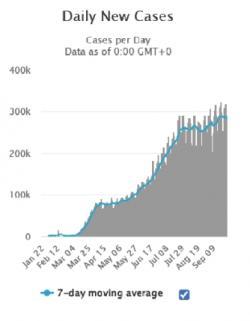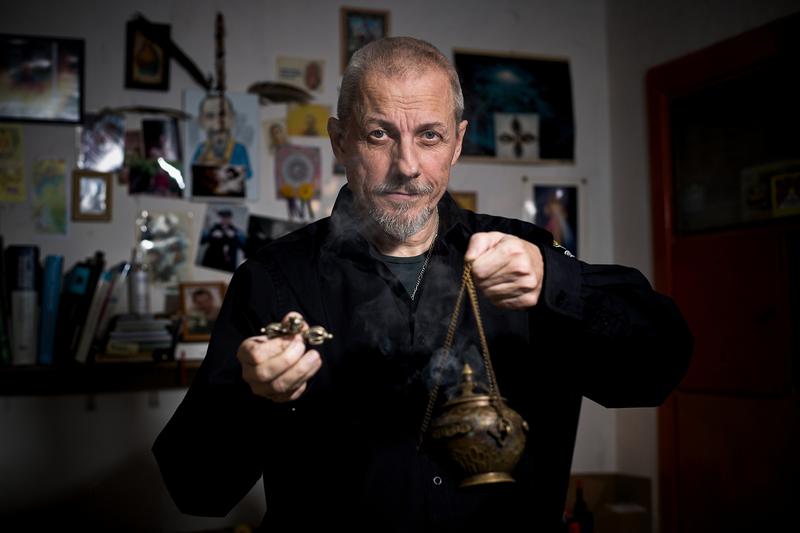
:: OSEL.CZ :: - "Chřipečkáři" has achieved its goal, the Czechia is emerging uncontrollably.
When the Czech Republic managed to deal relatively well with the first wave of the epidemic, it was possible to gain enough experience about the behavior of the virus and the course of the epidemic in various conditions that occurred in different countries. If society fails to respond in a timely manner and, by generally respecting hygiene measures such as social distancing, disinfection and the use of drapes, keeps the spread of the virus under control, there will be a burden of infection in the population that congestion in the health system area restrictions. If they manage to reduce the number of infected to a relatively low level, then limited effective hygiene measures, such as indoor drapes and restrictions on some of the most risky mass events, and clever quarantine can maintain a stable state. Such measures limit the company's economic and other activities in a minimal way. The vaccine, which is being developed in a number of laboratories, should then allow a complete return to normal.
An overview of deaths in the 15-44 age group in the 24 European countries participating in the Euromono project shows that this age group is affected very little by the influenza epidemic and the current COVID-19 epidemic.Countries such as Italy, Spain, the United Kingdom, Sweden and Belgium, which did not respond in time to the first wave of the epidemic, paid a large number of victims. The reports presented and their comparison are, of course, very strongly influenced by the way these deaths are recorded, which vary from country to country. Some report all cases of virus detection. In other cases, these are only cases where the main cause of death was respiratory and other problems caused by COVID-19. This is, of course, reflected in the reported numbers of victims. However, comparing the basic differences in the different approaches of states to the epidemic does not prevent this. A very good statistical analysis, which was updated several times, was written for Pavel by Pavel Brož. I described the experience from the first wave of the epidemic and its course in an article from the beginning of June. Here, too, I have stated that the increase in the number of COVID-19 epidemic deaths is very evident in the excess of deaths in the given period compared to previous years. We illustrate this here with data from the Euromomo project, which involves 24 countries and territories in Europe. It must be said that this increase also reflects deaths from other types of diseases in patients who have not received the necessary care due to congestion in the health system. However, the COVID-19 death statistics reported very well correspond to the increase in the number of deaths at the time compared to previous years.
An overview of deaths in the 45-64 age group in the 24 European countries participating in the Euromono project shows that this age group is already hit hard by the flu epidemic and the current COVID-19 epidemic.At the same time, these data show the impact of the basic differences in the properties of the coronavirus epidemic compared to classical influenza epidemics. Mortality from COVID-19 is more than an order of magnitude higher than that of influenza. The number of severe cases is also higher. At the same time, the infectivity of the virus is much higher and the patient spreads it without symptoms for a longer period of time. As a result, the epidemic has a very rapid onset without significant measures, leading to congestion in the health system. If we look at the data from Euromomo, we see that in the case of an influenza epidemic, the increase in the number of deaths at a given time is relatively low and spreads over a relatively long period of time. Thus, even in the case of unrestricted and larger measures, the health system is not overwhelmed. On the contrary, in the case of the COVID-19 epidemic, the increase in the daily death toll is really fast and dramatic. It is many times higher than in the case of the flu. And this also happens during the implementation of dramatic and relatively drastic measures, as well as area restrictions.
Deviation from the average number of deaths at a given time. Spain as an example of a country that failed to cope with the first wave of the epidemic (source Euromon).The data from different countries (here is a comparison of the situation in Spain and Finland) show that countries that, like the Czechia, managed to prevent the first wave through timely and effective measures, did not record an increase in the number of deaths. And this was in a situation where states, which, like the United Kingdom, first downplayed the risk of the epidemic, eventually had to impose dramatically greater restrictions than was necessary in our country. At the same time, it is possible to document from the data that, like the flu, COVID-19 affects the older generation far more strongly than the young. From these data, it is clear that timely implementation of effective hygiene measures and efforts to protect at-risk groups are critical to reducing the impact of the epidemic.
Other important information from the statistics of the first wave of the epidemic was that the response of the epidemic to the measures occurs in about two weeks. Similarly, the growth of hospitalized is followed by an increase in the number of infected in about two weeks and an increase in the number of deaths another week or two later. On the one hand, we have a signal of upcoming problems in advance and we have some time to react. On the other hand, some may constantly mitigate the risks by saying that while we have an increase in the number of people infected, we have few hospitalizations, serious cases and deaths and no action is needed. And it was in our country that there were a number of those who, at that time, downplayed the risks of the epidemic and the need for action. An example is Dr. Šmucler, or our Prime Minister and a number of opposition politicians. It is important in this case to monitor the reproductive number and early response to an increase in the number of identified infected.
Deviation from the average number of deaths at a given time. Finland as an example of a country that managed the first wave of the epidemic (source Euromon).Furthermore, a sufficient number of tests and the quality of intelligent rapid quarantine have proved to be very important. Their implementation, if kept limited in the population, can keep the epidemic under control even with relatively small restrictions. However, if the restrictions are loosened too much and the number of infected grows too much, no system can provide a sufficient number of scans and trace speeds. Every smart quarantine system has its limits.
At the same time, the economic impact and comparison of the situation after the first wave of the epidemic have shown that far less damage will be done by timely and drastic measures than hesitation and subsequent uncontrolled freezing. Sweden was often contrasted with the Czech Republic, as a state that approached only a minimum of bans. Nevertheless, the economic effects of the first wave of the epidemic on both countries were roughly the same. In addition, Sweden had only a large increase in the number of deaths during this period.
Tests after the first wave have also shown that even in heavily affected areas, population penetration is still relatively low. In addition, it is still unclear if and for how long the infected and sick will gain immunity. It is thus increasingly likely that the inherent immunity of the population cannot be achieved without the risk of an extremely large number of patients and the collapse of the health system.
The daily number of identified cases in the Czech Republic shows that the beginning of the growth that resulted in the second wave of the epidemic began in the Czech Republic in mid-June. (Source https://www.worldometers.info/coronavirus/).I wrote about these findings from the first wave in the aforementioned article at the end of June, comparing the results of the strategies of different states in the fight against the epidemic. I assumed that the Czechia would use this experience and build on a successful response to the first wave. It can thus avoid unnecessary deaths and economic losses due to the second wave. Unfortunately, this did not happen. Already in this analysis, I expressed my concern that the hygienic restrictions would be lifted too quickly. However, due to the very intensive campaign of the already mentioned "flu", the Czech Republic, unlike most other countries, eventually lifted almost all restrictions and failed in preparation for the second wave. From the position of one of the best states, it moved to the top of the worst in response to the epidemic. Let's look at the sources of this failure.
The government failed
The government has the responsibility and the power to act to address issues that threaten society. Of course, its powers are limited and it must also take unpopular measures that may reduce its political support. Real politicians should be able to bear this, and implement unpopular measures to solve problems. I understand that this is very difficult, especially today, when the opposition is using (or rather abusing) every such step to gain points in the political struggle. Even if she had to do them herself in the government position. There can be no excuse for not having a wave of very harsh words from the public and journalists following these unpopular measures. The most heard are those who attack everything unpopular without thinking. A political representation that aims to serve society should be able to bear this. And the current one has failed. This is a great pity, especially because, thanks to the favorable concurrence of coincidences, the first wave of the epidemic was halted by timely measures, which were relatively mild towards those in other countries, very quickly and without an increase in mortality. Unfortunately, this has also contributed to a large part of the public being encouraged to underestimate the risks of the epidemic and to call for the fullest possible release. However, this is not an excuse for a government that has experts and should see further. The fact that experts warned in time can also be seen in the events at the end of July and August, when, after the first warning numbers, they recommended at least returning to the veils. However, after the reaction of the public and the opposition to possible signs of such measures, the government quickly withdrew. At the end of August, this led first to the departure of epidemiologist Rastislav Hungarian, and the turmoil at the turn of August and September completely ruled out the possibility of mitigating the second wave in time. At that time, community transmission was beginning and the growth of the number of infected began to accelerate. Probably mainly in view of the upcoming elections, government officials were unwilling to take unpopular restraints in time.
The daily number of coronavirus deaths in the Czech Republic shows that the beginning of growth in connection with the second wave of the epidemic did not start in the Czech Republic until the beginning of September. (Source https://www.worldometers.info/coronavirus/).The opposition failed
However, the opposition also failed in a dramatic way. She, too, has political struggle as her only priority and is unwilling to work together to tackle the viral epidemic. Therefore, she criticized any government measures, and especially the unpopular ones. Of course, there are members and voters in each of the opposition parties who are more or less worried about the disease and the epidemic. However, precisely because of the use of this topic to fight the government, the voices criticizing the government's measures to limit the epidemic have always been heard. It was the opposition that politicized the topic of veils, which it often referred to as the muzzle that Babiš wanted to give to civil society. Wearing it as a sign of non-freedom and undemocratic thinking of government voters.
The course of the epidemic in the Czech Republic. The rapid increase caused by the second wave of the epidemic is clearly visible. (Graph prepared by P. Brož)The opposition's behavior is characterized mainly by the fact that instead of looking for and presenting concrete plans to solve the problems of the epidemic, it focuses purely on criticism of government actions. It will not support the government's actions, which it says are right and will not propose their own. By proposing restrictions, or relaxation, they could lose the support of some groups of voters. So absurd situations arise. At first, they strongly criticize the government for announcing restrictions. However, when it turns out that the epidemic has started, they criticize it for not restricting it before.
A typical example in this respect is the announcement and behavior of ODS chairman Petr Fiala. He writes on his blog that some voters tell him that it is purely a matter of scaring people and that the epidemic is harmless and no restrictions should be imposed. Others, on the other hand, call for restrictions to be tightened. Petr Fiala would rather not even indicate what should be done. When asked what he would do on the spot, he answers: "The answer annoys someone, but it is true: I would never get into this situation. Ask a man how to put out a fire that was caused by playing with matches. But he would never play with matches. This is exactly the difference between responsible and irresponsible politics. The spread of the disease could have been slower, more local, easier to demarcate and manageable under reasonable policies. "
The total number of victims in the Czech Republic, even here, has already begun a rampage caused by the second wave (Graph prepared by P. Brož).Let us remember, however, that he and Zbyněk Stanjura were the biggest critics of the rapid reduction in March, which stopped the first wave. Even in the second half of August, the introduction of drapes indoors was a sharp criticism, if only. So if the ODS were in the ruling role, it would not be better with the onset of the epidemic. Petr Fiala would thus get into an even worse situation. Even if this were not the case, of course, if the ODS rushes to power, it must reckon with the fact that it will take over the government in various situations. And Petr Fiala will probably answer that he will not solve the problems and has no idea how to proceed. He wouldn't get into this situation. I recommend that everyone read the text of a person who aspires to lead the state and should solve his problems in the future.
But all opposition parties behave exactly the same. So, for example, TOP-09 sent Roman Šmucler to the crisis staff, who is one of the biggest opponents of the use of veils and slowing down reprisals. I deal with energy in detail. So I recently commented on the presentation of views on the future of energy by TOP-09. In my opinion, this is a critical period for the development of our energy sector. If our society, and therefore our political representation, does not agree on a common support for a specific energy concept, it may be a bigger problem for the economy and living standards than the current epidemic. And TOP-09 does not offer an energy concept, but an overview of the opinions of its members. So, on the one hand, he expresses some support for the development of nuclear energy and, on the other hand, by Luděk Niedermayer, he opposes the construction of new units and the departure from nuclear power. It seems that he does not want to lose even the voters who are aware of the need to use nuclear energy for a low-emission mix in our country, but also those who are against nuclear energy.
The ratio of the total number of victims to the delayed total number of infected, which allows to some extent to estimate the mortality of the COVID-19 disease (graph prepared by P. Brož).A fundamental problem in the approach of political parties to solving the challenges we face is the very low willingness to participate in them together and to accept a rational compromise. There is never and nowhere an optimal optimal path. Each individual measure against the spread of the epidemic and their combinations have their negatives and positives. No ideal version can be found without problems. It is always a matter of finding a certain optimum and compromise. However, if each political party focuses only on attacking the negatives of each of the options offered by others and fighting against it in all circumstances, it will most easily end in inaction. And that can lead to disaster in the event of an epidemic or energy.
The course of the epidemic in the European Union. Here, too, the increase caused by the second wave of the epidemic is clearly visible. (Graph prepared by P. Brož).Frankly, precisely because of the described approach of all political entities in our country, I now have enormous problems finding someone to vote for.
(Pseudo) experts have failed
In the previous section, I named Roman Šmucler, who, together with Jan Žaloudík, Jan Pirk and Jan Hnízdil, is the biggest critic of the use of veils and other restrictions. At the same time, not only these doctors intensively mitigate the risks of the epidemic and are promoters of rapid penetration. According to them, only those who would die any other time would die and a quick penetration would ensure the immunity of the population. As already mentioned, hospitals and social services homes cannot be protected in the event of rapid reprisals, and at the same time it has not yet been possible to prove that the immunity of the population can be achieved somewhere by rebirth. However, these doctors, the first being a dentist, the second an oncologist, the third a cardiologist and the fourth an internist, deny the conclusions and recommendations of epidemiologists, immunologists and evolutionary biologists such as Rastislav Maďar, Václav Hořejší or Jaroslav Flégr. However, these physicians were accepted by the public as sources of sound information. At the same time, they recorded the feeling that people did not have to limit themselves, do not have to wear a veil and can enjoy a normal life. They have thus become one of the main reasons why the second wave of the epidemic has started so intensely now.
The total number of victims in the European Union, even here, has already begun a rampage caused by the second wave (Graph prepared by P. Brož).A large number of economists also overlook the fact that when the epidemic starts, the situation will naturally end in an uncontrolled freeze on the activities of companies, which is far more drastic and has far more dramatic economic consequences. An inexhaustible number of "economists" announcing against the restrictions slowing down the development of the epidemic is on the Internet, so on the contrary, I would like to refer here to a very reasonable view of the current situation of economist Jakub Steiner.
Lawyers are a special chapter. David and Vendula Záhumenští are very well known, who have filed lawsuits against the state of emergency and are still filing against past and present restrictions made during the coronavirus epidemic. Lastly, it is against the current restrictions on the opening hours of bars and pubs. According to them, the epidemic is not dangerous and does not justify the measures. These are thus only an attack on the freedoms of citizens. This is the type of lawyers who challenge any decision that can be very difficult in a complicated jungle of laws without multiple legal interpretations and completely formally clean. In essence, this prevents rational action, especially in dealing with unexpected and crisis situations. At the same time, it is not at all a matter of actually preventing any damage or ensuring the functioning of society and ensuring rights or justice. It is a similar type of people and legal groups, such as Miroslav Patrik, his Children of the Earth and the Ecological Legal Service of Happy Memory, who have attacked and are attacking almost every construction management of arteries. Even if it is clear that the construction must be completed and the delay leads more to environmental damage. Just to show that they can use legal loopholes, ambiguities in laws and rules, and the mistakes of officials to stay as long as possible.
The ratio of the total number of victims to the delayed total number of infected, which allows to some extent to estimate the mortality of COVID-19 (Graph prepared by P. Brož).It is precisely thanks to such an approach and activist law that, instead of seeking a rational and effective solution to problems, almost everything is criminalized, with a game of words and ambiguities in the texts of laws and rules. The most recent example is the legal battle started by SÚKL by accusing the Czech Post of illegal activity, which it allegedly carried out by distributing veils from larger packages and sending them. Let us recall that the point here is how to quickly get the veils and respirators in the necessary and similar ways to the necessary and similar ways, after the division from larger packages to the doctors already in the first wave. Only now, however, has a legal battle begun over whether it is a protective device or a medical material. The Office for Personal Data Protection is also launching an investigation into whether the post office could obtain and use the addresses of people from a certain age group. It was not at all that there was a real threat to health or something else. It is only a possibility of legal challenge and legal conflict. Such a conception of law, which is not about real justice and law, but about the use of every legal loop to attack and criminalize, leads to a huge loss of action and functionality of society. At the same time, it greatly seduces the abuse of legal activism into political and ideological struggle.

Journalists failed
Such allegations of illegality are then very attractive to journalists. As well as sharp attacks on politicians. Thus, politicians are directly pushing politicians in the talks. More and more examples of such a procedure can be found, for example, in Václav Moravec, for example during the last interview of Minister Vojtěch before his resignation. But the moderators of CNN Prima also excel in this, so that I don't just stay with ČT.
The worldwide daily number of cases is still growing (worldmeters).Dominantly, they are not about explaining or understanding things or finding agreement, cooperation and compromise, but about emotions, extreme opinions and conflicts. It is clear that no measure is ideally set, complete justice cannot be achieved. Instead of trying to shed light on the reasons and putting the measures into context, they choose the emotional statements of people with the most extreme views. It is with this that journalists, like politicians, contribute to the division of society and its inability to reach an effective compromise and cooperation in managing the epidemic. And that's what I've been talking about, "serious journalists" and omitted social networks and discussions under articles that stir up emotions even more.
A specific case is celebrities, to whom the media give a lot of space and their announcements have a significant impact on the general public. COVID-19 statements made by Lucie Bílá or Bára Basiková, who even said that she would like to become infected, are well known. This will probably ease when Petr Čtvrtníček finished in the ICU. In this case, he is probably not a person with an ideal lifestyle, but he also does not correspond to the idea of a polymorbid old man. Petr Čtvrtníček comes from us with Řež, his mother also taught our children, so I am very glad that his condition is perhaps already improving and he has not lost his humor.
The whole company failed
However, it must be admitted that we have all failed, the whole society. Of course, it was possible to take measures against the spread of the virus without orders, whether it was wearing veils, increasing hygiene and omitting risky activities.
Worldwide daily casualties (worldmeters).If we can do that, it could work well even if politicians and experts fail. But it is probably true that politicians are just a picture of society. So without orders, almost everyone put down their veils and plunged into the whirlwind of summer life. It should be emphasized that outdoor activities, attending cultural events or holidays by the sea are not a problem. The problem is when the "cultural event" is a party in a club or I decide to visit bars and discos by the sea. As it turned out, it is possible to run a number of activities relatively safely and with a minimum of risky contacts. And if we were responsible enough, the recommendations would really suffice.
The global course of the epidemic. There is a continuous increase in both infected and active cases. (Graph prepared by P. Brož).After all, the decline in cases in the many-mentioned Sweden occurred mainly due to the fact that the Swedes themselves complied with their own restrictions without orders. Just to clarify, Sweden also had the whole summer and still has relatively drastic restrictions on mass events. Unfortunately, we did not behave responsibly in society, on the contrary, there was rather a seamstress and a demonstrative protest against hygienic rules and restrictions.
The youth failed
Youth is often cited as a progressive element of society, but even that has failed in response to the epidemic. In reality, young people are the least at risk, and their acceptance of restrictions and caution is really more of an expression of responsibility towards society and its other components. And it is difficult to assume in a situation where responsibility towards society does not occur in the elderly that it will be in the young. It is young people who are typical visitors to bars, clubs and discos, which are becoming the most common outbreaks. A typical example is the coronavirus spread at the Techtle Mechtle Club. At the beginning of September, introductory meetings of students entering universities at Macha Lake also took place, which became the focus of the epidemic among students and their families. This was already the case when there was a growing curve of cases of infection and the transition to community spread was clearly visible. Even in such a situation, the events were organized and were very contact. I fully understand that young people can hardly give up such actions. I still remember the dating stay before starting matfyz. On the other hand, unfortunately, the current epidemic is a reality. If we do not accept certain restrictions, it has consequences. So even such actions have contributed to the spread of the virus in the population to such an extent that it is necessary to reduce contact teaching at universities.
Worldwide death toll. Continuous growth can be seen (Graph prepared by P. Brož).And I really can't understand the students' approach here anymore. They are preparing protests and demonstrations against online teaching. Does he really think that their protests will scare the virus away and disappear? Since I teach at the university, I know that an online lecture cannot completely replace contact teaching. The opportunity to see the reactions of the listeners, the immediate question or the discussion cannot be replaced. It's even worse with exercise. And this is no longer the case with laboratory work or practical activities. However, in a crisis case where society is threatened by a real danger that leads to the need to limit contact teaching, it is necessary to accept online lectures. Again, it is possible to play them if necessary, and many things can be discussed and resolved online. Furthermore, it is necessary to look for methods that will enable contact teaching in cases where online teaching is impossible. It is definitely possible to do exercises with a limited number of students while securing distances. It is also possible in the laboratory or in the workplace. It is also possible to move lectures online into the first part of the semester. Secondly, if the virus load in the population can be reduced again, implement exercises and practices in contact form. A reasonable compromise must be sought between the need to limit the spread of the virus while providing the best possible teaching conditions. And the demonstrations will do nothing.
Unfortunately, I have a growing impression that a large proportion of today's young people have the idea that everything must be theirs and they have a right to everything. And that everything can be achieved through demonstrations and protests. That even demonstrations can bring about change or even denial the laws of nature. I encounter this very intensively in the field of energy and ecology. Recently, for example, there was an occupation strike at the Faculty of Philosophy, Charles University, organized by the Climate Movement. From the interviews with the strikers and the organizers, it was clear that they had no idea about the issues and possibilities of the transition to low-emission technologies and the environmental impacts of various technologies. According to them, all you have to do is step down and suddenly the laws of nature change, new technologies appear and everything is solved smoothly.
Such ideas, which are unfortunately spread by some ideological groups, are also taken over by high school students. Last year, I attended a discussion between high school climate strike organizers and scientists. And even there it was clear that the knowledge of these organizers on related topics is very limited and it is more a matter of repeating ideological slogans and abbreviations. Although they boasted the need to listen to scientists, they did not want to hear science or scientists at all. That is, if they do not accentuate their ideologically written pattern.
The ratio of the total number of victims to the delayed total number of infected, which allows to some extent to estimate the mortality of COVID-19 (Graph prepared by P. Brož).Europe and the USA also failed
In the previous text, I tried to summarize the main reasons for the failure of measures against the epidemic in our country. However, the failures that have taken place in other European states or the United States have very similar reasons. The fundamental problem of the European Union is that there is very little coordination of cooperation in dealing with the epidemic. There is thus a big difference in the approach of individual states, as well as in their epidemiological situation. It is thus a problem to prevent epidemic outbreaks from spilling over from one country to another. A už zmíněné vlivy způsobují, že žádná země Evropské unie na tom není z hlediska epidemiologické situace dobře, a některé jsou na tom, podobně jako Česko, spíše velmi špatně.
Jedním z hlavních důvodů selhání Evropy je, že navrch se dostává ideologie a racionální využívání vědeckých faktů a poznání je potlačováno. Veřejnost je zde na jedné straně utvrzována v představě, že svoboda je bez zodpovědnosti a znamená, že mám právo na vše, co si představím. Na druhé pak, že demonstracemi a závazky lze popřít i přírodní zákonitosti a dosáhnout vytýčeného ideologického cíle. Místo efektivní snahy a spolupráce při hledání cesty, jak čelit rizikům a výzvám, jsme tak svědky neustálých nelítostných ideologických a politických střetů. Příkladem takového ideologického přístupu k epidemii, který absolutně nebere v úvahu fakta je u nás třeba Alexandr Tomský. Výsledkem je i neefektivní reakce na epidemii. Možná ještě větší podíl na katastrofální reakci na epidemii to mělo v USA, které se tak staly z hlediska dopadů nejpostiženějším regionem.
Denní počet identifikovaných případů v Jižní Koreji. Ta zvládla i druhou vlnu epidemie velice dobře (worldmeters).Bohužel politické vedení Evropské unie podléhá ideologickému tlaku už delší dobu a stále více. Ideologickým bojem proti GMO jsme si přivodili zpožďování v biotechnologiích. Ideologickým bojem proti emisím jsme vytlačili řadu průmyslových odvětví z Evropy a zahráváme si s obrovský průšvihem v energetice. Zde se na jedné straně bojuje za snížení emisí a přechod k co největší elektrifikaci. Na druhé se však bojuje proti jednomu z klíčových nízkoemisních zdrojů – jaderné energetice. Vyhlášení Zelené dohody pro Evropu a její urychlení deklarované předsedkyní Evropské komise von der Leyenovou jako opatření pro překonání ekonomických následků epidemie hrozí v případě realizace katastrofou nejen pro Českou republiku. V oblasti energetiky je daný program as ním spojené závazky úplně mimo realitu přírodních zákonů a reálně dostupných technologií. S ideologickým tlakem evropského parlamentu proti jaderné energetice to pro českou energetiku, jejíž reálné možnosti přechodu k nízkoemisnímu mixu jsou popsány v nedávném článku, může mít katastrofální dopady. Evropa tak nadřazením ideologie nad vědu, technologický rozvoj a racionální přístup, ztrácí pozice právě v těch oblastech, které jsou klíčové pro bezpečnost, ekologii, ekonomiku i životní a kulturní úroveň.
Také Japonsko zvládá epidemii velice dobře (worldmeters).Naopak se ukazuje, že jsou státy, které dokáží čelit epidemii efektivně as omezenými ekonomickými ztrátami. Japonsko, Jižní Korea i Vietnam už mají za sebou druhou vlnu a zvládly ji velmi dobře. Stejně jako v Česku, i Japonsko a Jižní Korea udělaly chybu s otevřením klubů a barů. Ovšem po prvních ohniscích, které se tam objevily, je rychle opět zavřely. I díky rychlé reakci v tomto případě se podařilo epidemii opět utlumit. U nás po událostech v klubu Techtle Mechtle, které jasně ukázaly rizika, která z těchto podniků plynou, trvalo více než měsíc, než se alespoň omezila doba jejich provozu. A i to je napadáno jako nepřiměřený zásah do svobod občanů. Všechny tyto státy mají násobně více obyvatel, přesto mají celkově srovnatelně nebo méně infikovaných. Myslím, že klíčové pro tento výsledek je zvyk a ochota používat roušky, celková úcta k ostatním a větší ochota akceptovat omezení a elektronický dohled u chytré karantény.
Excelentně si v době epidemie vede i Vietnam (worldmeters).Ještě obdivuhodnějším případem je z hlediska toho, jak čelit epidemii, Čína. Ta sice na počátku selhala. Bylo to však v době, kdy se o viru, jeho vlastnostech a nebezpečnosti téměř nic nevědělo. Pak v Číně dokázali infekci téměř úplně vymýtit. Takže v celkovém počtu infikovaných tuto miliardovou velmoc doháníme dokonce i my. Dnes mají pouze desítky případů infikovaných denně a celkově mají necelé dvě stovky aktivních případů. Většinou jsou importované. Ekonomika Číny tak sice byla v první půli roku postižena, ovšem nyní běží znovu ve velmi dobrém tempu. Navíc je Čína v čele snahy o získání vakcíny. Je to dáno i tím, že se v této oblasti nesoustředí na ideologii, ale na vědu a technologii. A je to i v jiných oblastech Nedávno Čína vyhlásila, že v roce 2060 dosáhne uhlíkové neutrality. Na rozdíl od Evropské unie však chce nízkoemisní mix budovat podle racionálních technologických kritérií ze všech možností. Intenzivně se tak zde kromě obnovitelných zdrojů budují i zdroje jaderné.
Ve Spojených státech se epidemie šíří kontinuálně, jde o nejpostiženější zemi (worldmeters).Jak už bylo zmíněno, největší selhání nastalo v USA, kde se intenzivně epidemie šíří téměř kontinuálně. Jaké to bude mít dopady na ekonomickou, společenskou a bezpečnostní situaci nejen této velmoci, ale celého světa, se lze jenom dohadovat.
Průběh epidemie v USA. Počet aktivních případů stále kontinuálně roste. (Graf zpracoval P. Brož).A zatím to nevypadá na to, že by USA našly efektivní cestu, jak epidemii čelit. V situaci, kdy nejen političtí představitelé této země mohou už poměrně dlouho využívat poměrně rozsáhlá data o vlastnostech tohoto viru, je tak dost absurdní obviňování Číny z nezvládnutí situace na počátku, kdy to byla nová a překvapivá záležitost.
Conclusion
V současné době je celkově již přes 33 milionů identifikovaných infikovaných a přes milión obětí epidemie. Počet obětí tak už překonal i velké chřipkové epidemie. A to zdaleka nejsme možná ani na vrcholu jejího průběhu. Byly nalezeny metody, jak této epidemii čelit bez přílišných omezení a ekonomických dopadů. Bohužel je však dokázali využít pouze někde. Že jsme nedokázali efektivně čelit druhé vlně epidemie, je do velké míry způsobeno i zmiňovanými „chřipečkáři“.
Počet obětí v USA. Je vidět kontinuální růst (Graf zpracoval P. Brož).V předchozích částech jsem ukazoval, že selhaly všechny složky společnosti. Znám politiky, kteří se chovali racionálně a snažili se prioritně o řešení epidemie. I zde jsem jmenoval několik odborníků, kteří ukazovali na existující rizika a možné způsoby, jak jim efektivně čelit. Stejně tak znám i novináře, kteří nejdou čistě za senzací, ale snaží se o vysvětlování a informování. A hlavně znám spoustu mladých lidí, kteří chtějí poznávat, učit se a nacházet řešení pro výzvy, které před nimi stojí. Značná část lidí také udržela respekt před nákazou, dokázali dodržovat hygienická pravidla a vyhýbali se rizikovým činnost. Tady nešlo o strach a zavření se do izolace. Nešlo o to, si nedopřát dovolenou v českých horách nebo iu moře. Z toho riziko nehrozilo. Šlo však o to, neúčastnit se na těch horách nebo u moře mejdanů v barech a dalších hromadných akcí. A hlavně bylo třeba dodržovat hygienická pravidla, včetně roušek v uzavřených prostorách.
Poměr celkového počtu obětí ku zpožděnému celkovému počtu infikovaných, který umožňuje do jisté míry odhadnout smrtnost nemoci COVID-19 (Graf zpracoval P. Brož).Bohužel však došlo k tomu, že jsme selhali jako celek a „chřipečkáři“ dosáhli svého. Česko se nekontrolovaně promořuje. Takže na vlastní kůže zažijeme to, čemu se nám podařilo při první vlně vyhnout. V situaci, kdy radikálně přibývá případů, začíná být větší část lidí opatrnější. Zároveň už byla uplatněna některá omezení. Takže nepůjde o úplně volné šíření a postupně se tak snad podaří křivku zploštit, a nakonec i snížit počet infikovaných v populaci. Nenastanou tak nejhorší varianty, které vychází Jaroslavu Flégrovi pro úplně nekontrolované šíření epidemie.
V podzimní době přicházejících viróz a nachlazení to však nebude jednoduché. Chtělo by se mi věřit, že představy pana doktora Šmuclera a jemu podobných o neškodnosti koronaviru a ideálnosti rychlého proměřování jsou pravdivé. Bohužel se však obávám, že jsou mimo a právě i kvůli nim bude spousta zbytečných obětí. Jak upozorňuje zmíněný Jarda Flégr, je současný koronavirus ještě docela "slabčák" a mohou se objevit daleko nebezpečnější druhy. Z tohoto hlediska je naše neschopnost racionální a efektivní reakce velice varující.







